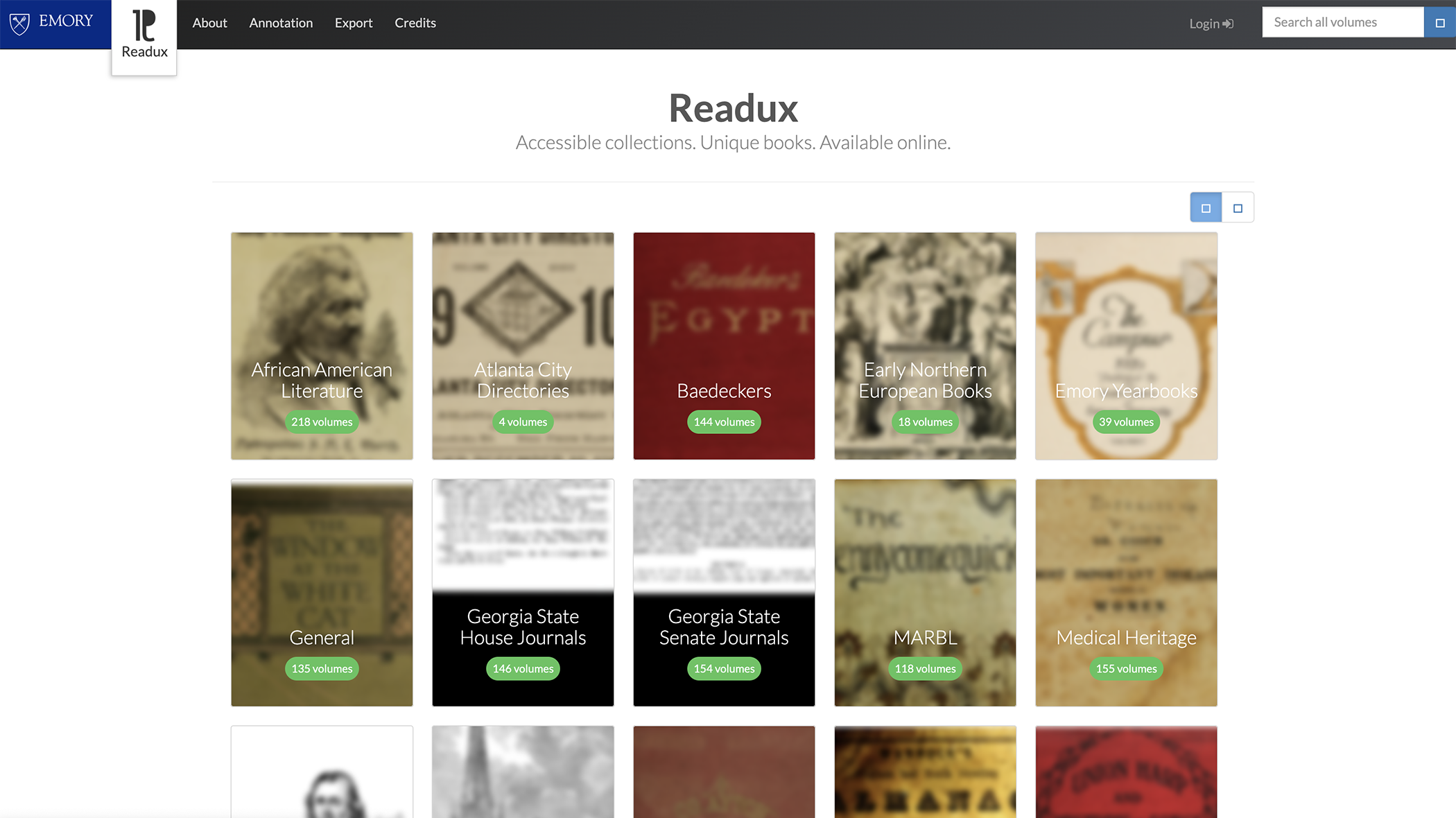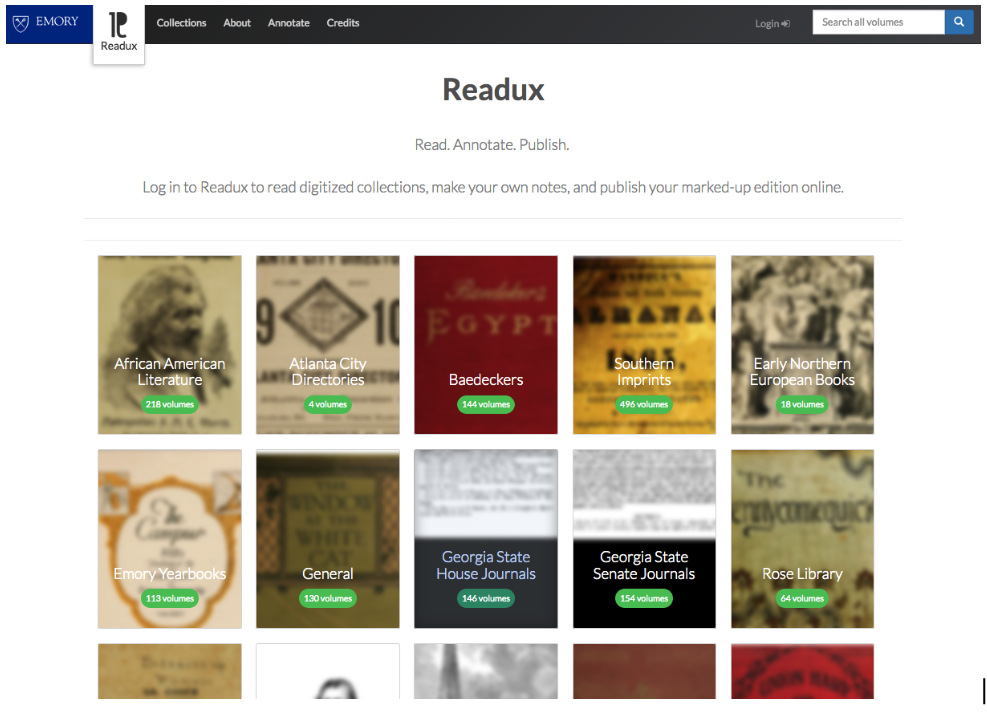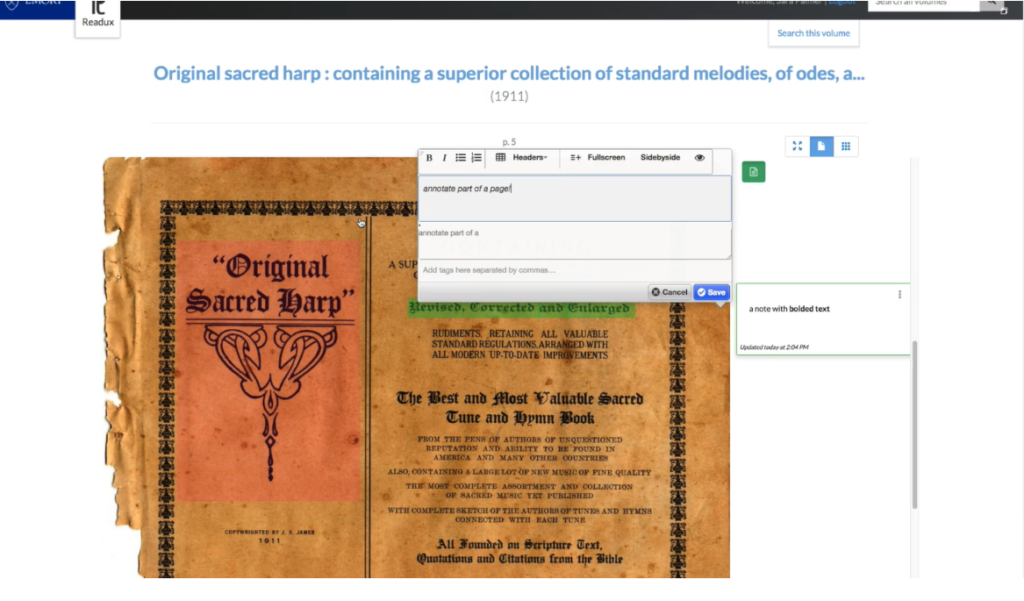Readux Legacy is the predecessor for the Readux application developed and maintained by the Emory Center for Digital Scholarship. Readux is an open source software platform that offers a web-based space to engage with digitized print materials. The current version of Readux owes much to the concept, design and technical innovations in Readux Legacy. Here we take a look at some of the history and ingenuity of the original app.
History and Features
Readux Legacy began as an application to make volumes digitized at Emory Libraries more discoverable. In the early 2010s thousands of volumes were digitized by the library but there was not yet a centralized web portal for accessing them in their respective thematic collections, such as yellowback novels or African-American history. Simultaneously researchers at ECDS identified the need for a tool to enable the creation and publication of annotated digital editions of digitized books. From 2014 through 2016, lead engineer Rebecca Sutton Koeser and the Library Software Engineering Team (LSET) coordinated with staff at ECDS to build an online reading room for these volumes that enhanced engagement through tools like annotation, text analysis, and digital publishing. A complete list of contributors can be found on the Readux credits page.
Central to the innovation of Readux Legacy was the ability to apply multimedia annotations to both regions of a page image and the digitized text itself.
Writing custom Python templates and Javascript code, Koeser pioneered a method to elegantly overlay this textual content on the page image in the application. You can see this in action in this animated gif that captures the experience of text selection within Readux Legacy.
https://rlskoeser.github.io/images/posts/rdx/osh-textselect.gif
Beyond text overlays, Readux Legacy was a veritable multitool for digital scholars:
- Multimedia Layers: The app allowed for the embedding of audio and video files, the incorporation of Zotero citations, tags, and even internal references to other pages in a digitized volume.
- Exportable Insights: Scholars could transform annotated volumes into stand-alone static websites hosted on GitHub, democratizing the publishing of critical editions.
- Textual Analytics: With just a few clicks, users could send text data to Voyant, an online platform for text analysis.
- Search Capabilities: Whether it’s a single book or an entire corpus, Readux Legacy offered a robust full-text search function.
- Collaborative Engagements: Multiple users could annotate texts, thereby fostering collaborative research and pedagogical initiatives like classroom projects.
These affordances provided a rich environment for digital scholarship, described in James Lacitignola’s review as “a clear example of how digital tools can streamline the sometimes-cumbersome process of conducting research in the humanities.”
Impact at Emory and Beyond
Readux Legacy has fostered scholarly engagement through a variety of projects. It has been used in classrooms to annotate primary resources including 19th-century herbarium, 16th-century emblem books, and 20th-century Apollo 15 space flight logs. A team of scholars used Readux’s export feature to produce a digital edition of the 1521 Erfurt printing of Passional Christi und Antichristi. A collaborator at Wayne State University Libraries, Graham Hukill, contributed code and set up a Readux Legacy instance to support work with collections of historical newspapers and Shakespeare editions. These interactions have provided valuable use cases that continue to inform the development of the Readux app.
As versatile software, the original Readux code has found a legacy of reuse within digital projects at the Center for Digital Humanities (CDH) at Princeton University. A IIIF Python code library developed for Readux Legacy has matured into a more expansive tool at CDH. Another Readux Legacy code module was repurposed for documenting Jacques Derrida’s annotations in the Derrida’s Margins project. The success of Readux Legacy code at CDH exemplifies the transformative potential of open-source software in fostering collaboration and innovation across projects at different institutions.
The current version of Readux embraces many of Readux Legacy’s innovative functions, including digital text overlay, annotation, and edition publishing. The new Readux also moves beyond Readux Legacy in building on IIIF to facilitate the import of books from multiple digital repositories, a shift from Readux Legacy’s architecture built atop Emory’s Fedora repository. With Readux now stable and continuing to add features, ECDS archived Readux Legacy in summer 2023. Readux Legacy’s source code remains accessible as a branch on Readux’s GitHub repository and original documentation persists online. We also maintain a bibliography of articles, presentations, and reviews about Readux and Readux Legacy.
As we navigate the evolving landscape of digital scholarship, it’s important to recognize and honor the foundational tools and platforms on which we continue to build. Readux Legacy stands as a testament to the enduring power of well-designed digital tools in enriching both research and pedagogy.


